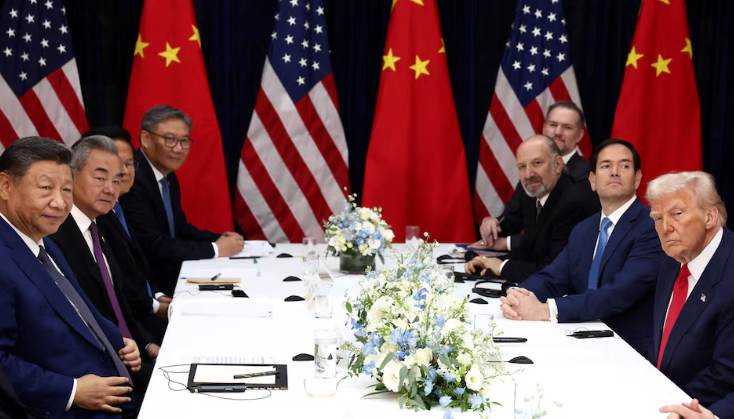ALIGATH MUSLIM UNIVERSITY MEDIA NETWORK
Trump and Xi Strike Deal to Cut China Tariffs, Tackle Fentanyl and Rare Earths Trade
AMU MEDIA WORLD STREAM
MOHD SHOEB RASHID KHAN & REUTERS WORLD NEWS
10/30/20253 min read


Trump, Xi Agree on Tariff Cuts and Fentanyl Crackdown in Landmark Busan Meeting
BUSAN, South Korea, Oct 30 (Reuters) – U.S. President Donald Trump announced on Thursday that he and Chinese President Xi Jinping had reached an agreement to reduce tariffs on Chinese goods in exchange for Beijing taking stronger action against the illicit fentanyl trade, resuming American soybean imports, and maintaining exports of rare earth elements.
The face-to-face meeting in the South Korean port city of Busan — their first since 2019 — concluded Trump’s fast-paced Asia tour, during which he also promoted new trade understandings with South Korea, Japan, and several Southeast Asian nations.
“It was an amazing meeting,” Trump told reporters aboard Air Force One shortly after departing South Korea, rating the talks a “12 out of 10.”
Under the new arrangement, tariffs on Chinese imports will fall from 57% to 47%, including a 50% reduction on duties related to fentanyl precursor chemicals. Trump said Xi had pledged to “work very hard to stop the flow” of fentanyl, a synthetic opioid responsible for tens of thousands of overdose deaths in the United States each year.
Beijing also agreed to suspend its newly introduced export controls on rare earth minerals — key materials used in electric vehicles, aircraft, and advanced weapon systems — for one year, China’s commerce ministry said in a statement.
Both countries also reached consensus on expanding agricultural trade and pledged to find a resolution regarding the short-video platform TikTok, which Washington seeks to bring under U.S.-controlled ownership.
Markets React Cautiously
Global markets responded cautiously to the detente, with major Asian indexes and European futures fluctuating between gains and losses.
China’s Shanghai Composite Index (.SSEC) retreated from a 10-year high, while U.S. soybean futures weakened.
“The market’s reaction has been measured compared to Trump’s enthusiastic characterization of the meeting,” said Besa Deda, chief economist at William Buck Advisory in Sydney.
Among major U.S. trading partners, only Brazil and India remain subject to elevated tariffs.
In the days leading up to the meeting, global markets — from Wall Street to Tokyo — had rallied on hopes of a breakthrough in the long-running trade war between the world’s two largest economies.
A Cordial Exchange at APEC
The cordial talks took place at a South Korean air base on the sidelines of the Asia-Pacific Economic Cooperation (APEC) summit and lasted more than 90 minutes.
Xi told Trump that “occasional frictions are normal,” adding that China’s development and rejuvenation were not incompatible with Trump’s goal of ‘Making America Great Again.’
The two leaders also agreed to pause reciprocal port fees on shipping, a move expected to ease tensions in the shipbuilding and logistics sectors.
Trump later said in a Truth Social post that China would begin purchasing U.S. energy, hinting at a potential deal involving a $44 billion LNG pipeline project in Alaska.
The White House said it hopes the Busan summit will be the first of several meetings between the two leaders in 2025. Trump announced plans to visit China in April, with Xi expected to visit the U.S. later in the year.
Chinese state media framed the meeting as a diplomatic success for Xi, with Xinhua quoting him as saying, “We have the confidence and capability to navigate all kinds of risks and challenges.”
Lingering Issues: AI Chips and Taiwan
While the agreement effectively restores trade relations to their pre-“Liberation Day” status, analysts warned that the deal represents only a fragile truce in a broader rivalry between Washington and Beijing.
Trump confirmed that he did not discuss Nvidia’s Blackwell AI chip with Xi, dealing a further blow to the U.S. tech firm’s ambitions in China’s $50-billion AI market.
The sensitive topic of Taiwan — the democratic island claimed by China — was also absent from the discussions.
However, just minutes before the Busan meeting began, Trump authorized the resumption of U.S. nuclear weapons testing after a 33-year pause, citing growing nuclear stockpiles in Russia and China.
China’s foreign ministry later expressed hope that the U.S. would continue to honor the moratorium on nuclear testing.
